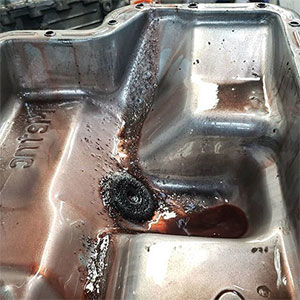Posted on 8/19/2024

You’re driving along, radio up loud and the wind in your hair, when suddenly, there it is–the dreaded check engine light. Unfortunately, this is a moment that nearly every driver on the road has experienced. Before you board the train to Panic Station, take a deep breath and the following advice: 1. Don't Panic First things first, don't panic. Seriously Panic Station is bleak, don’t go there. While the check engine light can indicate a range of issues, it doesn't necessarily mean your car is on the verge of breaking down. Sometimes, it's just a minor problem that needs attention. 2. Check for Other Warning Signs Take note of any other symptoms your car might be experiencing. Is it making strange noises? Running differently? Overheating? These additional clues can help you and your mechanic diagnose the problem more accurately. 3. Tighten Your Gas Cap Believe it or not, a loose or faulty g ... read more
Posted on 7/25/2024

Transmission debris is the accumulation of small particles, metal shavings, and other contaminants that can be found in a vehicle's transmission fluid. This debris can be a sign of wear and tear on the transmission system and can lead to serious issues if left unaddressed. Transmission debris can come from several sources, including normal wear and tear on the transmission system, poor maintenance, and internal damage to the transmission. Over time, the small metal particles that result from the friction of the transmission's moving parts can mix with the transmission fluid and accumulate in the transmission's filter and pan. When transmission debris accumulates in the transmission, it can cause a range of problems, including slipping gears, transmission overheating, and increased wear on the transmission components. In severe cases, transmission debris can even cause the transmission to fail completely, resulting in costly repairs or the need for a complete t ... read more
Posted on 6/8/2024

Choosing St. George Transmission for Auto Repair in St. George When it comes to finding a reliable and trustworthy place for auto repair in St. George, look no further than St. George Transmission. Our team of expert mechanics is dedicated to providing top-notch service and getting you back on the road safely and quickly. Whether you need routine maintenance or complex repairs, we are your go-to destination for all things auto repair in St. George. Why Choose St. George Transmission? At St. George Transmission, we pride ourselves on offering comprehensive services for all your vehicle needs. Here are just a few reasons why we stand out for auto repair in St. George: 1. Expert Technicians Our highly skilled technicians are trained to handle a wide range of issues, from transmission problems to general auto repair. With years of experience in the St. George auto repair industry, our team can diagnose and fix problems efficiently, ensuring your vehic ... read more
Posted on 5/13/2024

P0700 is a diagnostic trouble code (DTC) that is related to the transmission control system in vehicles with automatic transmissions. This code is set when the vehicle's onboard diagnostic system detects a problem with the transmission control system, which could indicate a wide range of issues. Here's what you need to know about P0700 codes and why further testing is necessary. The P0700 code is a general code that indicates that there is a problem with the transmission control system. It does not provide any specific information about the problem, only that there is an issue that needs to be addressed. Some common issues that can trigger a P0700 code include faulty sensors, wiring problems, or problems with the transmission control module. While the P0700 code does not provide specific information about the problem, it does indicate that there is an issue that needs to be addressed. To determine the specific problem, further testing is necessary. This typically ... read more